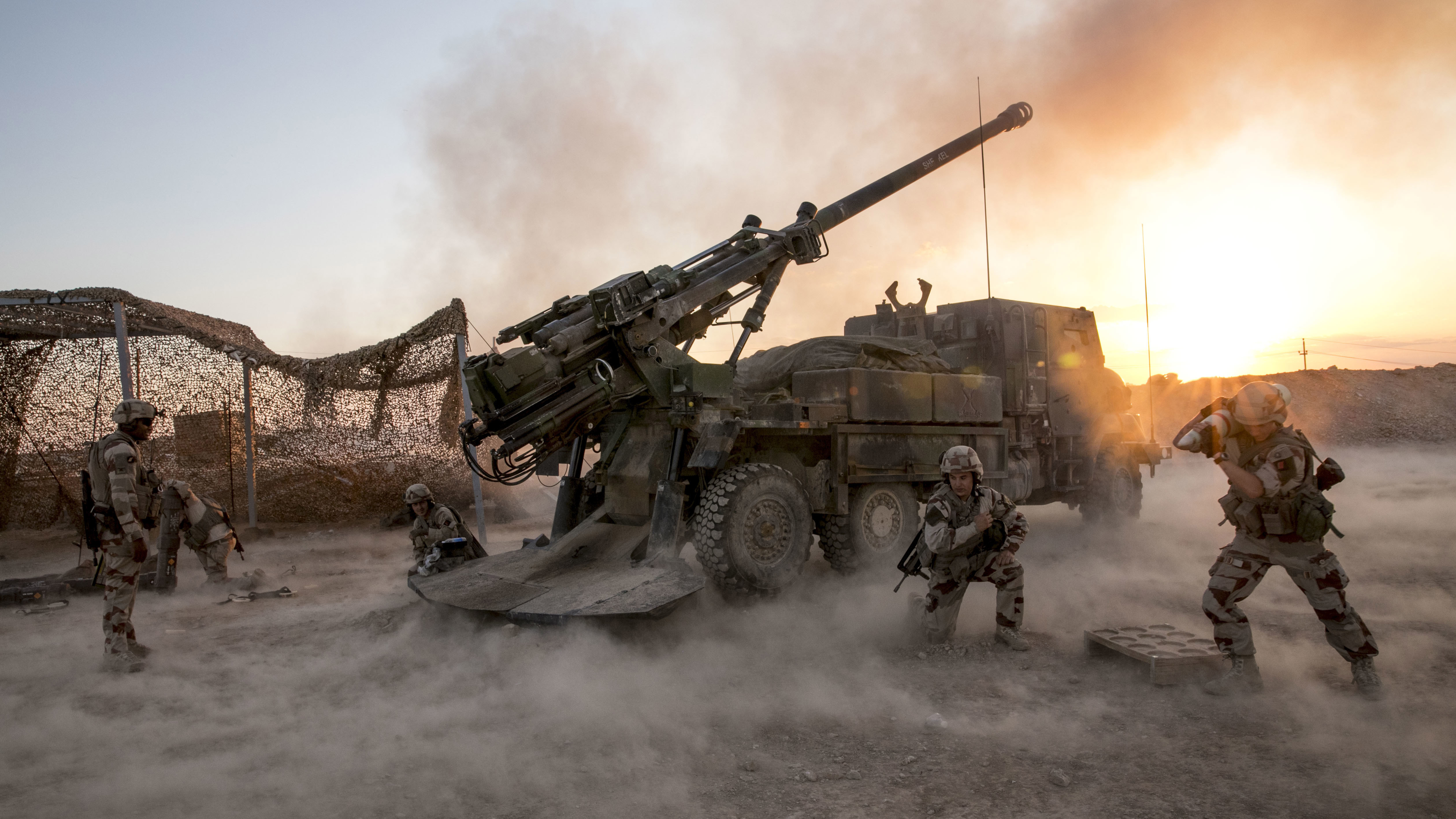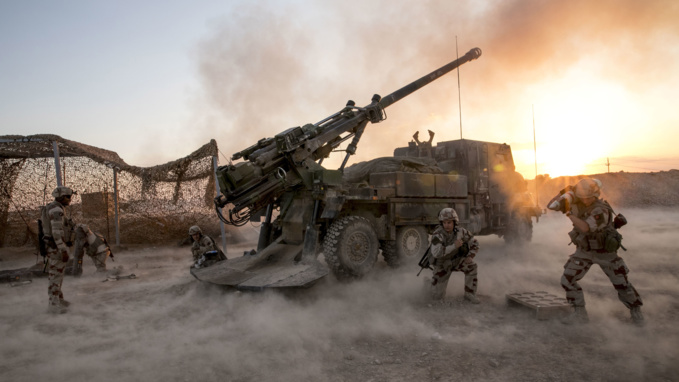GIAT industries became Nexter in 2006, as the group downsized to half its previous workforce in order to focus on its core activities. The business had been founded in the 1970s but had always been under state subsidy - something Paris wanted to change in the course of the privatization era. A year before the rebranding into Nexter, GIAT started turning a solid profit and has never fallen short since. With a steady cash flow of approximately half a billion euros per year, Nexter is currently booked for the 3 years to come. The latest results publication stated - : “Nexter's total of orders amounted to €612 million. Two significant orders, the contract for 37 CAESAR® howitzers for Indonesia and the French multi-year large-calibre order, represent 43% of orders for the year. With the addition of the conditional tranches of commercial contracts in progress, Nexter's order book totaled €2.6 billion, accounting for nearly three years of business.” The activity is expected to continue growing. In the past decade, Nexter has developed many new military land vehicles, including the VBCI combat vehicle, and the Caesar artillery truck, which rank both at the top of their respective markets
Nexter has designed among the highest-performing pieces of land military equipment in Europe and benefits greatly from France’s stable level of military spending, which guarantees that long-term programs can be pursued towards technological leaps. The high demand of the active domestic army guarantees stable activity to Nexter, but the “Nexter” development phase also includes international development. As a flagship product driving international sales, the Caesar canon can probably be considered a major stilt of Nexter’s success. The truck-mounted artillery system implements a configuration which has been any times attempted (and has been again since) and brings it to an overall level of performance which had previously never been achieved. The Caesar system is mounted on a six-wheeled chassis, and totes a 155-mm cannon able to fire within 30 miles. The new artillery truck has been used in Afghanistan, Syria, Iraq, and been sold to Saudi Arabia, Thailand, Denmark, and Indonesia. It provides a NATO-compatible middle solution between towed howitzers (easily deployed but offering no protection) and self-propelled artillery (which offers heavy armoured protection but is a nightmare to deploy).
Nexter knows it holds a sizable advantage in sales, due to the Caesar being virtually the only truck-mounted artillery which has been deployed in high-intensity battle and given more than satisfying results to the most advanced and demanding armies. The Caesar artillery system has been used in Afghanistan and provided the coalition with one of the things it needed the most: coverage. The 50 kilometres of radius which the artillery tube provides makes a circle over 300 square kilometres, which can be quickly repositioned, and which denies entire areas to the enemy. Additionally, since artillerymen are exposed to counter-attacks in Afghanistan, the howitzer is appreciated for its multiple-shot feature, which enables to strike a target with up to 6 simultaneous rounds before relocating. Nexter’s other flagship, the VBCI, has also been deployed in Mali, where is provides infantry with increased mobility and protection.
Because armament deals are so politically charged, Nexter includes within its development strategy a local partnership parameter, in which part of the production is delegated to manufacturers within the client country. This boosts the attractivity of Nexter’s products in two ways. An armament purchase contract (generally quite expensive) will generate jobs within the client country and will also give the client more grip on the logistics and maintenance of the equipment it will be using. This last part taps into a concept which has been developed by the French and has proven quite successful abroad.
The French concept of “sovereignty providing” entails that the equipment is not only sold as a military tool, but is designed, in the program’s entirety, to uphold a nation’s capacity to exist on the international scene and enforce its will. The concept is generalized within the entire French industry, and Nexter has adopted it fully. In the recent sale of Nexter’s Infantry Fighting Vehicle (VBCI) to Qatar, defence reporter Halal Husseini stated that “The partnership between the two companies supports the acquisition of the Véhicule Blindé de Combat d’Infanterie (VBCI) fighting vehicle for the Qatar Armed Forces Al Rayyan programme. A joint venture (JV) has been established in Qatar, which will serve as the local industrial base for the delivery and maintenance of complete vehicles for the Al Rayyan programme.”
Nexter is not the only defence firm in France to have implemented this international strategy of sovereignty providing. However, with France currently taking leadership, with Germany, over European matters, the land defence segment is receiving particular attention and strong development efforts, as one of the strongholds of Europe, compared to naval and air segments of the market. With technologically dominating products, and complete command of the supply chains, Nexter’s strategy abroad is proving very promising.
Nexter has designed among the highest-performing pieces of land military equipment in Europe and benefits greatly from France’s stable level of military spending, which guarantees that long-term programs can be pursued towards technological leaps. The high demand of the active domestic army guarantees stable activity to Nexter, but the “Nexter” development phase also includes international development. As a flagship product driving international sales, the Caesar canon can probably be considered a major stilt of Nexter’s success. The truck-mounted artillery system implements a configuration which has been any times attempted (and has been again since) and brings it to an overall level of performance which had previously never been achieved. The Caesar system is mounted on a six-wheeled chassis, and totes a 155-mm cannon able to fire within 30 miles. The new artillery truck has been used in Afghanistan, Syria, Iraq, and been sold to Saudi Arabia, Thailand, Denmark, and Indonesia. It provides a NATO-compatible middle solution between towed howitzers (easily deployed but offering no protection) and self-propelled artillery (which offers heavy armoured protection but is a nightmare to deploy).
Nexter knows it holds a sizable advantage in sales, due to the Caesar being virtually the only truck-mounted artillery which has been deployed in high-intensity battle and given more than satisfying results to the most advanced and demanding armies. The Caesar artillery system has been used in Afghanistan and provided the coalition with one of the things it needed the most: coverage. The 50 kilometres of radius which the artillery tube provides makes a circle over 300 square kilometres, which can be quickly repositioned, and which denies entire areas to the enemy. Additionally, since artillerymen are exposed to counter-attacks in Afghanistan, the howitzer is appreciated for its multiple-shot feature, which enables to strike a target with up to 6 simultaneous rounds before relocating. Nexter’s other flagship, the VBCI, has also been deployed in Mali, where is provides infantry with increased mobility and protection.
Because armament deals are so politically charged, Nexter includes within its development strategy a local partnership parameter, in which part of the production is delegated to manufacturers within the client country. This boosts the attractivity of Nexter’s products in two ways. An armament purchase contract (generally quite expensive) will generate jobs within the client country and will also give the client more grip on the logistics and maintenance of the equipment it will be using. This last part taps into a concept which has been developed by the French and has proven quite successful abroad.
The French concept of “sovereignty providing” entails that the equipment is not only sold as a military tool, but is designed, in the program’s entirety, to uphold a nation’s capacity to exist on the international scene and enforce its will. The concept is generalized within the entire French industry, and Nexter has adopted it fully. In the recent sale of Nexter’s Infantry Fighting Vehicle (VBCI) to Qatar, defence reporter Halal Husseini stated that “The partnership between the two companies supports the acquisition of the Véhicule Blindé de Combat d’Infanterie (VBCI) fighting vehicle for the Qatar Armed Forces Al Rayyan programme. A joint venture (JV) has been established in Qatar, which will serve as the local industrial base for the delivery and maintenance of complete vehicles for the Al Rayyan programme.”
Nexter is not the only defence firm in France to have implemented this international strategy of sovereignty providing. However, with France currently taking leadership, with Germany, over European matters, the land defence segment is receiving particular attention and strong development efforts, as one of the strongholds of Europe, compared to naval and air segments of the market. With technologically dominating products, and complete command of the supply chains, Nexter’s strategy abroad is proving very promising.



















